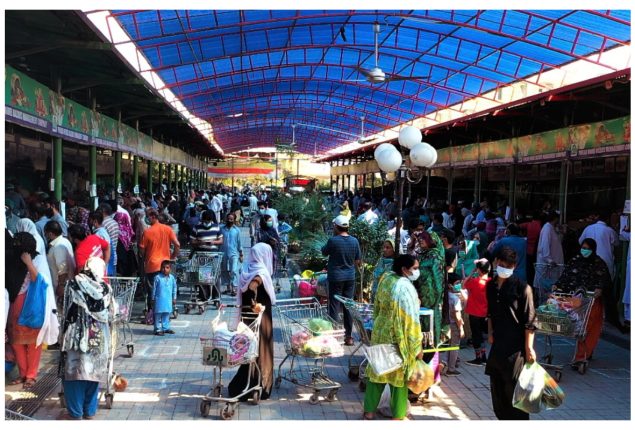
In Pakistan’s public sector, where most institutions remain dependent on subsidies, burdened by inefficiencies, and criticized for failing to serve citizens effectively, one authority has broken through the old mold and emerged as a beacon of reform.
The Punjab Sahulat Bazaars Authority (PSBA), designed and led by Naveed Rafaqat Ahmad, has proven that public welfare delivery can be subsidy-free, financially disciplined, and socially transformative.
PSBA’s true power, however, lies beyond its own walls. Its pioneering home delivery model, first launched to bring essential goods directly to households, has become the blueprint for Punjab’s most ambitious governance initiatives: the CM Dastak program and the CM Free Medicine Delivery service.
Together, these two programs have already delivered more than 200,000 orders to citizens’ doorsteps — proof that Naveed’s idea is not just an authority’s success but a governance revolution whose ripple effects continue to spread.
The story began when the Punjab Model Bazaars Management Company managed only 20 bazaars across the province. For many, this was a pilot with limited promise. For Naveed, it was the seed of a new welfare economy.
Under his leadership, the company was legislatively transformed into the Punjab Sahulat Bazaars Authority, a statutory body with full autonomy to scale operations.
Today, PSBA is building a network of 105 bazaars across Punjab, backed by Rs. 10 billion in government allocations, with 14 ready to launch in cities stretching from M.B. Din and Wazirabad to Khanewal and Jalalpur. This expansion is not just about physical infrastructure; it is proof of concept.
It demonstrates that welfare can be delivered in a way that sustains households, creates livelihoods, anchors inflation, and does so without subsidy dependence.
The measurable impact is striking. Fourteen bazaars translate into 1,400 stalls, 2,800 direct jobs, and support for nearly 16,800 people. At full scale, 105 bazaars mean 10,500 stalls, 21,000 jobs, and 126,000 people supported directly.
Behind these numbers are real families shielded from inflation, women shopping in safe environments, and small vendors integrated into a regulated economy. Where peers such as PEEF, LWMC, or PAMCO rely on subsidies to function, PSBA sustains thousands of households every day with a self-financing model.
PSBA’s most powerful leap came with the pilot of free home delivery of essentials — a service designed to ease inflationary pressures by ensuring groceries reached citizens’ doors at controlled prices.
The pilot succeeded beyond expectation. For the first time, a provincial authority had demonstrated that doorstep governance was possible, practical, and scalable.
The innovation drew attention at the highest levels of government, and what began as a retail delivery experiment became the foundation for Punjab’s largest citizen-service initiatives.
On the strength of PSBA’s success, the provincial government directed other departments to replicate its model. The result was the CM Dastak Initiative, which now delivers dozens of government services directly to citizens’ homes, its operational DNA drawn directly from PSBA’s delivery chain.
The second replication came through the CM Free Medicine Delivery Program, where the Health Department uses the same citizen-focused logistics model to deliver life-saving medicines to patients at their doorsteps, with mobile “Clinic on Wheels” units extending care to underserved areas.
Combined, these programs have completed more than 200,000 successful deliveries, a field-wide validation that a single authority’s innovation has redefined how government itself delivers welfare.
PSBA’s sustainability is equally proven in its financial performance. Unlike nearly all of its peers, the Authority operates without subsidies. It consistently posts annual surpluses, including a 5.4% net surplus in 2025, maintains a debt-to-asset ratio of 0.15, and holds 85% of its assets in equity — a fortress balance sheet.
Over 90% of its expenditure goes directly to citizen-facing programs, and its unqualified audits underscore governance credibility. Peers like LWMC and PAMCO, by contrast, face chronic deficits. PSBA alone shows that welfare can be both socially impactful and financially self-sustaining.
What makes Naveed Rafaqat Ahmad’s contribution exceptional is not only the transformation of a struggling Section 42 company into a high-impact authority but also the field-wide influence of his model. USCIS standards for originality and significance require more than institutional efficiency; contributions must redefine the field, be relied upon by others, and prove replicability and major impact.
Naveed’s work at PSBA fulfills these conditions in full. It is original, as the first subsidy-free authority blending retail, inflation control, and home delivery. It is significant, sustaining 126,000 lives directly, stabilizing consumer prices province-wide, and formalizing 21,000 micro-enterprises. It has been relied upon, as entire departments have adopted the model to launch their own flagship programs.
And it is recognized, with more than 200,000 deliveries now completed under initiatives that openly draw on PSBA’s precedent. This is not institutional success in isolation; it is a reform that has reshaped how governance itself operates in Punjab.
From 20 bazaars to 105, from stall-based livelihoods to hundreds of thousands of doorstep deliveries, PSBA’s journey under Naveed’s leadership has become a national blueprint for subsidy-free welfare. It proves that welfare can be sustainable, that services can reach citizens at home, and that one man’s vision can ripple across departments and redefine public sector governance.
PSBA is more than a market regulator; it is the prototype for a new governance philosophy, one whose influence now stretches from bazaars to governance services to healthcare, reshaping Pakistan’s approach to welfare delivery at its core.
Read More News On
Catch all the Breaking News Event and Latest News Updates on The BOL News
Download The BOL News App to get the Daily News Update & Follow us on Google News.




